A Webinar was held on 2nd June, 2021 on “Portugal Pakistan Relations and Future Aspirations” under the auspices of Karachi Council on Foreign Relations (KCFR). Chairman KCFR Ikram Sehgal hosted the session. The Plenary speaker was HE Paolo Neves Pocinho, Ambassador of Portugal. Commodore (Retd) Sadeed Anwar Malik, Secretary General and CEO KCFR opened proceedings.
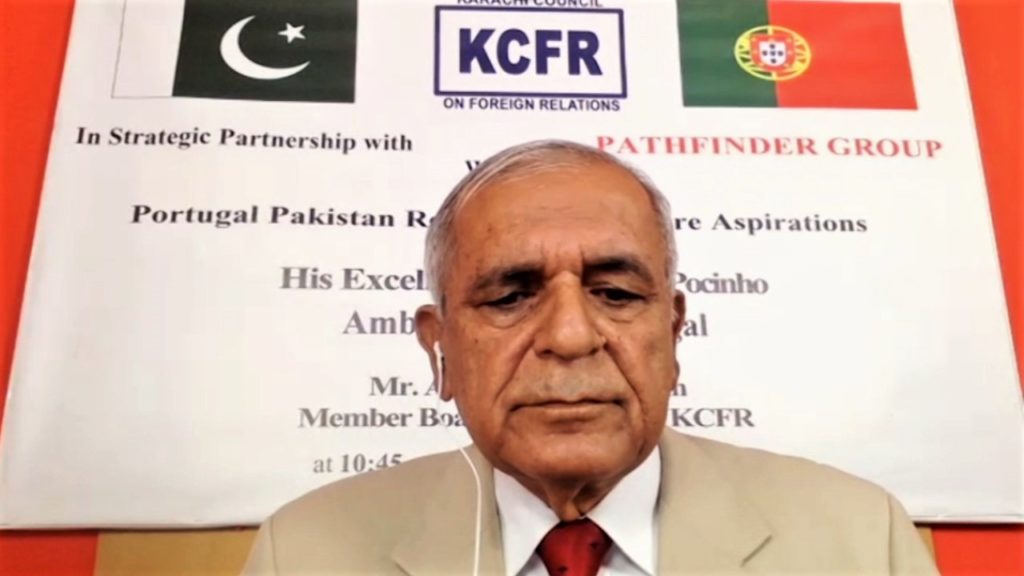
Cdr (R) Sadeed A Malik: Thank you, sir. Excellency Paulo Neves Pocinho, Ambassador of Portugal in Pakistan, distinguished guests, Chairman and members of KCFR, ladies and gentlemen, I am Commodore Sadeed Malik, Chief Executive Officer and Secretary General of Karachi Council on Foreign Relations. I will share briefly about KCFR. KCFR was founded by late former Chief Justice of Pakistan, Justice Saeed-uz-Zaman Siddiqui. It was chaired by Governor Sindh, followed by Federal Minister Moeen-ud-Uddin Haider, then Quaid-e-Azam’s grandnephew, former Attorney General and Senior Advocate Mr. Liaquat Merchant, followed by former Chief of Naval Staff Admiral and later Ambassador Shahid Karimullah and Mr. Shahid Amin.
We hold seminars, meetings and deliberate mainly on foreign relations and economic affairs. Ever since Covid-19 we are holding webinars. We have held a number of webinars including with the President of Pakistan, the President of Azad Jammu and Kashmir, Security Advisor to the Prime Minister of Pakistan, the Education Minister, former Finance Minister, Ambassadors of a number of countries and delegates of foreign countries.
Today’s program will be moderated by our revered member Board of Governors Mr. Arshad Saeed Hussain who is presently the Managing Director of Oxford University Press. He is an alumni of Aitchison College and London School of Economics and has headed a number of multinationals in Pakistan, including Abbott Laboratories. We will have introductory remarks by Ambassador Zehra Akbari, after that we will have His Excellency’s address, a Question/Answer session, and at the end we will have our Chairman Ikram Sehgal who will pass a vote of thanks.
May I now request Mr. Arshad Saeed Hussain to welcome H.E. Paulo Neves Pocinho, Ambassador of Portugal in Pakistan. Mr. Arshad Saeed Hussain.
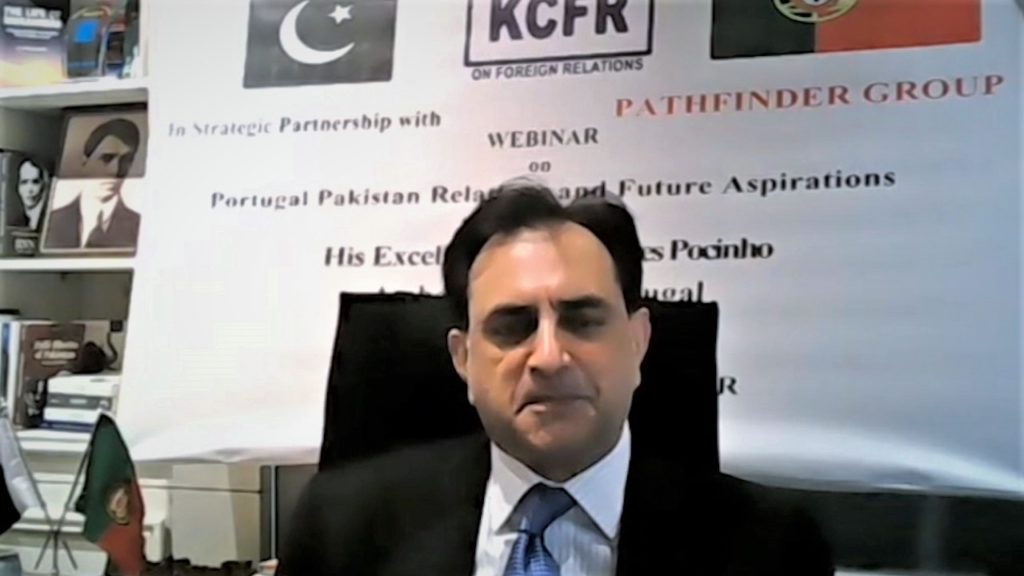
Mr. Arshad Saeed Hussain: Thank you Commodore Malik. It’s an honor for me to moderate this webinar with Mr. Paulo Neves Pocinho, Ambassador of Portugal in Pakistan. Your Excellency, on behalf of the Chairman and members of the Karachi Council on Foreign Relations, I would like to welcome you to this webinar. We’re looking forward to learning from you about the age-old relationship between our two countries and how we can further improve this relationship for the mutual interest of our countries.
His Excellency Paulo Neves Pocinho holds a degree in Philosophy from the University of Coimbra. After joining the Foreign Service in 1989, Ambassador Pocinho served in several foreign missions and postings including with the Embassy of Portugal in Mexico in 1995, as Consul General in New York in 1999, as Consul General in Goa in 2007, Deputy Permanent Representative at the Council of Europe in 2010, and Consul General in Paris in 2015. In the Ministry of Foreign Affairs, Ambassador Pocinho served in different departments and was the head of the Visa Department at the Directorate General of Consular Affairs prior to his nomination.
Before his Excellency, we will have an address by Ambassador Zehra Akbari who has been an envoy to Portugal. Ambassador Zehra joined the Foreign Service of Pakistan in 1983. She served as ambassador of Pakistan to Mexico with concurrent accreditation to Costa Rica, Panama, El Salvador, and Nicaragua. She was High Commissioner of Pakistan to New Zealand with concurrent accreditation to Samoa. She also served as ambassador of Pakistan to Portugal with concurrent accreditation to São Tomé and Príncipe.
Ambassador Zehra Akbari served at the Ministry of Foreign Affairs of Pakistan in different important positions from the Section Officer to Director Kashmir Affairs and Director General South Asia and SAARC. She held diplomatic assignments in Pakistani missions abroad in Washington, Kuala Lumpur, Warsaw, and Dublin. She served as Special Secretary Ministry of Foreign Affairs before her retirement. She was awarded the Order of the Aztec Eagle by the Mexican government. May I now request Ambassador Zehra Akbari to address and tell us about the history of diplomatic relations between Pakistan and Portugal.
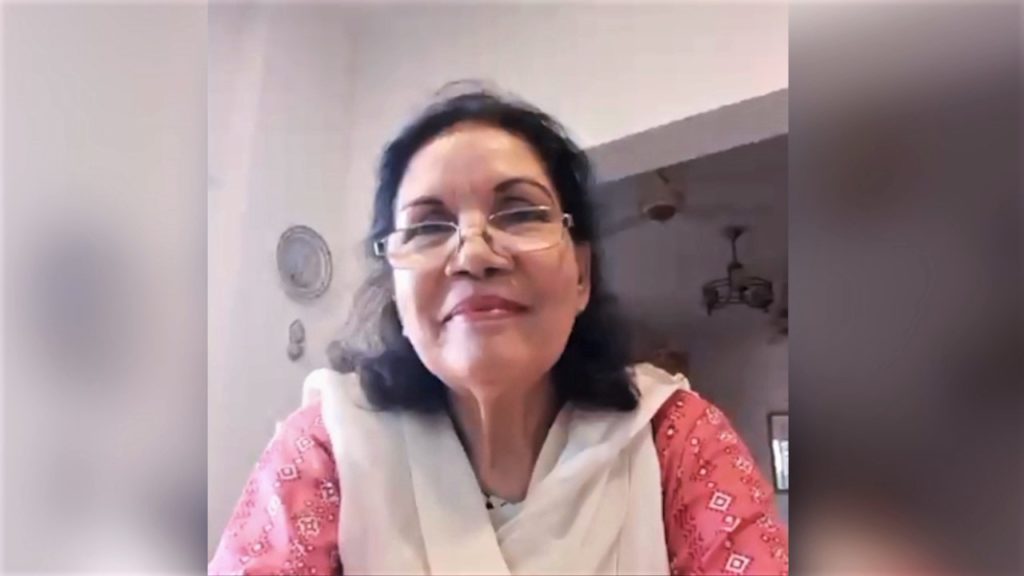
Ambassador Zehra Akbari: Thank you. One thing is for sure and you were also mentioning before the start of the webinar that Covid-19 despite its devastations and havoc has at least popularized online meetings and seminars, as we are meeting today. This is the new normal; the meeting apps including Zoom, though already available a few years ago, have only now become so popular enabling us to meet up and hold conferences while maintaining social distancing, as I am addressing the seminar from Islamabad and you people are hosting it in Karachi.
For me, it is a great privilege to virtually join the webinar at the Karachi Council on Foreign Relations which is an institution of higher repute and to speak about the history of Pakistan’s diplomatic relations with Portugal. I am delighted to be part of this intellectually curious and thought-provoking discourse. I am particularly grateful to Chairman Ikram Sehgal for giving me the opportunity for this valuable interaction. I would also like to thank Mr. Arshad Saeed Hussain for the kind words of introduction. His Excellency Paulo Neves Pocinho will be speaking in detail about Pakistan and Portugal relations. I will only briefly give an overview of the history of our diplomatic relations.
Pakistan and Portugal established diplomatic relations on 7 November, 1949. This was followed by the opening of a lower-level Portuguese mission on November 14, 1949 in Karachi. The first Portuguese Plenipotentiary Minister presented his credentials in 1952. In 1958 the Portuguese mission in Karachi was raised to the level of an Embassy. The government of Pakistan opened a Liaison Office in Lisbon in 1954. For a number of years our High Commissioner in London was also covering Portugal as non-resident ambassador. In 1976, this was raised to the level of a Resident Ambassador and our presence in Lisbon has since been maintained. During the early years and particularly in the aftermath of annexation of Goa by India, Pakistan facilitated the evacuation of Portuguese civilians and their families from Goa to Lisbon via Karachi. At the international level both countries have maintained partnership on several issues of global concern and have worked for the promotion of global peace and security. Overall, relations and contacts have remained warm and friendly. The two sides, where possible, have all along coordinated their efforts at the United Nations and other multilateral for a to support each other in various international matters including each other’s candidatures.
Pakistan and Portugal have signed bilateral agreements relating to air services, trade, mutual investment and protection of investment, avoidance of double taxation, avoidance and prevention of fiscal evasion and a protocol of cooperation between the Foreign Service Academy of Pakistan and the Portuguese Diplomatic Institute. More recently, MoU on bilateral consultations between the foreign ministries of Pakistan and Portugal was signed for promotion of contacts in a more structured and regular manner. Under this mechanism, two rounds of bilateral and political consultations have been held since 2016 in Lisbon and Islamabad. The few visits that have been exchanged between the two sides, since the establishment of diplomatic relations, include the visit to Lisbon by President Iskandar Mirza in 1958. The former president of Portugal, Mr. Mário Soares visited Pakistan in 1995. Former President of Pakistan Asif Ali Zardari met with the then Portuguese Prime Minister José Sócrates in Abu Dhabi on the sidelines of World Energy Summit. Foreign Minister Shah Mehmood Qureshi visited Lisbon in 2010 and earlier, the Foreign Minister of Portugal Mr. Luís Amado had visited Pakistan in 2009.
More recently, the Health Minister of Portugal, Adalberto Campos, visited the Aga Khan Hospital in 2018 in Karachi. MoU was signed for exchange of medical expertise and knowledge in the laboratory and medical sciences. Mr. Usman Dar, Special Advisor to the Prime Minister on Youth Affairs visited Lisbon in June, 2019.
Pakistan and Portugal have maintained cooperation in the field of commerce and trade and several companies on both sides have been doing business for the last several years. The overall trade volume has remained above $150 million, mostly in Pakistan’s favor. The exports from Pakistan include cotton yarn, synthetic fiber, cotton fabric, synthetic fabric, chemicals, surgical instruments and rice. Imports from Portugal include yarn, industrial machinery, dyes and chemicals. The defense forces of the two countries have also maintained ties all these past several years.
The Pakistan Portuguese Parliamentary Friendship Group has existed in the Portuguese Parliament since 2006; similarly, in the National Assembly of Pakistan, since 2013. The Parliamentary Friendship Groups in both countries serve as a useful forum to promote parliamentary contacts and exchanges. In conclusion, let me restate that Pakistan attaches great importance to its relationship with Portugal, both in the bilateral context and within the framework of the European Union. The two countries have traditionally enjoyed cordial and friendly relations over the years. Thank you.
Mr. Arshad Saeed Hussain
Thank you so much for your very informative briefing, Ambassador Zehra. I will now invite H.E. Paulo Neves Pocinho, Ambassador of Portugal in Pakistan for his plenary address.
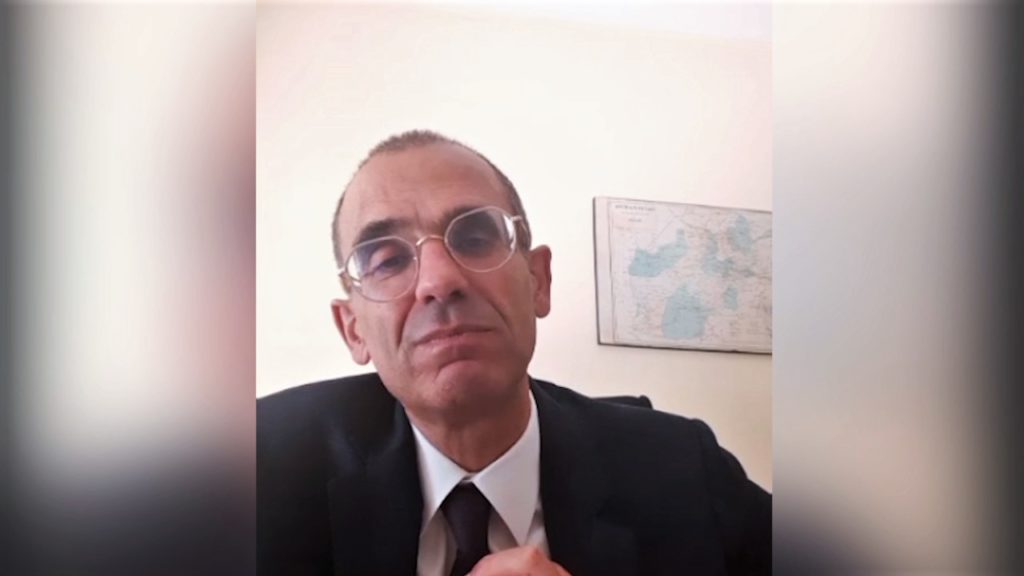
H.E. Paulo Neves Pocinho: Good morning and thank you so much. Firstly, I’m sorry for the delay as there was some difficulty in the connection. I would like to thank the Karachi Council on Foreign Relations for this opportunity to speak about Portugal and Pakistan, also thanking Mr. Ikram Sehgal, Commodore Sadeed Malik, Mr. Arshad Saeed, members of the board and most warmly I would like to thank very much Ambassador Zehra Akbari for participating in this seminar. The Ambassador did fantastic work in Portugal. She is very well known in Portugal and I imagine she was able to have many friends there, and I think we should thank her for what she did for the bilateral relationship. In terms of bilateral relationship, the Ambassador made a very interesting historical overview which I don’t have much to add to. I would like to concentrate on the political bilateral consultations.
We are preparing for this year in November a new edition of these political consultations which is a little bit delayed because the last one was arranged in 2018; but then Covid-19 and the EU Presidency of Portugal delayed the organization of the new edition of these consultations. Now in November, we are working to have a fruitful consultation. We have two or three agreements pending between the two countries.
It is very important to regularly hold consultations which is vital for strengthening friendship and bilateral relationship. I arrived in Pakistan in 2019. We changed the Embassy, we changed the facilities and the premises which were a little bit outdated, and we also started to renew the consular services which we were sensing were a little bit frozen in the last few years. We hired more staff, we have new premises and I can tell you that in the last few months we have improved in terms of the Consular Services, which is very important for the bilateral relationship because there is, not that large, but an interesting Pakistani community in Portugal, which requires different services from us on issues like family reunions, paperwork for legalization of their stay in Portugal, etc. This was very important and at this moment, I can say that we have upgraded our Consular services.
Now is the moment to strengthen the political relations for which we are going to have political consultations in November. In the cultural field and visa waiver for diplomatic passports, there are pending agreements. There are other agreements for which I would like to finalize negotiations. Another area which is challenging is the commercial relation which is very imbalanced to the side of Pakistan but it is something that I would like also to strengthen.
Before Covid-19, I was visiting different chambers of Commerce to establish contacts, but of course, with Covid-19, things got a little bit more difficult, but I think now we can start coming back to regular working. As Ms. Ambassador said, Covid-19 also brought some improvements. Now we can also meet in such online conferences which is important because sometimes it not so easy to go and physically meet someone.
I had a very long intervention to make on my experience as a diplomat and the history of Portugal and some facts. If you bear with me and if you have time in spite of the delay, then I will try to select what I think can be more interesting for the panel.
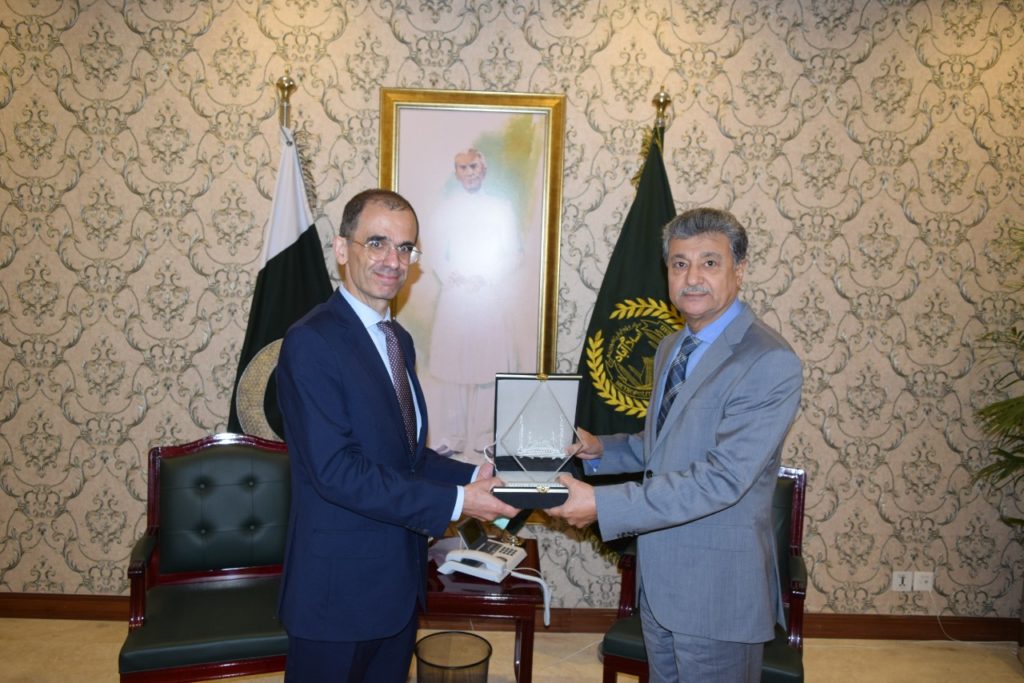
I would start to say that in terms of my diplomatic experience, I would like to highlight two posts which were more interesting for me in terms of personal experience. One was when I was Consul General in Goa between 2007 and 2010. It was very touching because it was a former Portuguese colony; there we could find many pieces of heritage of Portuguese culture; many churches, streets with Portuguese names, history of the discoveries, architecture with a blend of Portuguese influence, Italian influence and influence from the subcontinent. It is a place with lovely architecture, if you ever find yourself the opportunity to visit. Residential houses in the midst of forests which are beautiful and unique such architecture is not there in other parts of the world because it’s a blend of different cultures. I was only the career Consul in Goa so I was a very popular person and I had access to everyone, so it was very interesting in that regard. In a way, it is an interesting connection to Pakistan for the bilateral relations because as the Ambassador said after the taking over of Goa in 1961, Pakistan helped the Portuguese to go back to Portugal. I think there is a community in Karachi whose ancestors are from Goa or maybe people that moved to Pakistan after 1961. Politically we could speak for hours about that.
India took over Goa in 1961 but only after 1974 when Portugal recognized Goa as part of India because between ‘61 and ‘74, our regime which was a dictatorial regime had its own ideology and never gave up any colony, not only Goa but also the other colonies. In this context, we gave independence to the older colonies after ’74 and we became a democracy and that was an end to the colonial period. The relation between Portugal and Pakistan has always been very friendly and very warm. What I think is the challenge today is to make it more substantial in order to deal with all the challenges that we have at the international level.
Afterwards, I was posted in Strasburg at the Council of Europe. It is the only pan-European organization where we have 47 European countries. Not only the European Union, it is the seat of the European Court of Human Rights. The Council of Europe works along the European Court of Human Rights. It is the institution that supervises the compliance of European countries with the European Convention of Human Rights. So, it was a multilateral experience and I learned much in terms of human rights, democracy and rule of law.
In my intervention, I was going to discuss about the history of Portugal. We were independent in 1143, we are the oldest country in Europe with actual borders and it took several centuries to settle completely in our borders. In 1385, we had a battle with Spain, which was the most important battle in terms of the consolidation of our borders because we are in the Iberian Peninsula and Spain is much bigger than us. At that time, we had the difficulty of dealing with a bigger entity, Spain. So in 1385, the battle was one of the most important in this context. Afterwards, in 1386, we celebrated the Treaty of Windsor with the United Kingdom, which was a treaty of peace and friendship. It was strategically very important for us because it was a way to balance the pressure of Spain with the support of an external power in the region, which was the UK. It was a military power so it was easy for it to come to Portugal to give assistance and it was far enough not to be a threat to Portugal so it was a balance. Of course, today we have fantastic relations with Spain, we are brothers. Portuguese and Spanish are very similar languages. Spain is our most important commercial partner and we both are members of the European Union. We are both members of the Ibero-American Space, and we have very warm relations. Recently the President of Portugal was re-elected and the first two visits that he made as president were to the Holy City in Rome and the other to Spain to meet the Head of the State.
There are many interesting facts about Portugal, for example, in 1498,Vasco de Gama discovered the sea route to India and it opened the period in which Portugal controlled for some decades, the trade routes in the Indian Ocean. We were fighting in South Asia with the Roman Empire and different powers of that time. We were very small but we were able to control, for some decades the trade routes. It is interesting to note that in the context of the Indian Ocean, we tried to control the Makran Coast in the south of Pakistan and we also had some fights with the Baloch people. I read that Mir Hammal Khan Baloch is still celebrated today by the Baloch people as Nero of the Baloch people against the Portuguese. The Makran Coast is very widely spoken of in the Portuguese literature about the discoveries. There were many interactions in the 16th century. The Portuguese traders were all over this area, so, I think it is an interesting connection.
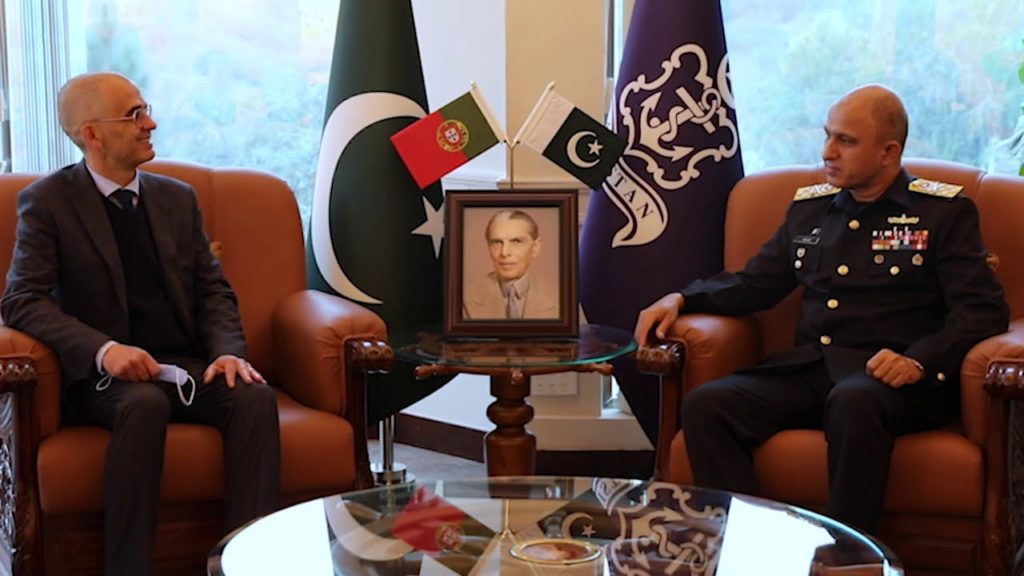
Another interesting connection we had is in the 17th century, we had the Portuguese missionary Bento de Góis. At that time there was an idea that in China, there was a Christian kingdom that was called Cathay. It was an imaginary Christian kingdom, I think the Christians were looking for Christian kingdoms everywhere (laughter) so this was like a legend. This missionary was given the charge of finding this Kingdom in China. He traveled in South Asia from Lahore, Peshawar, Kabul and then to Pamirs towards China. It seems he was the first European to cross overland in South Asia to China. Of course, he never found the Christian kingdom but he visited China.
Moving forward a little bit, in the 19th century, Portugal was the first European country to abolish the death penalty, which is something still very important today in the 21st century. This is a problem still in Europe. For example, Belarus is not a member of the Council of Europe precisely because of the issue of the death penalty.
In 1974, Portugal transitioned towards democracy because there was a colonial period with numerous wars. Everyone was tired of the regime and there was a need to bring democracy. It was a very peaceful process which interesting to study. It is given sometimes as a model for peaceful transition to democracy because the military took over power in 1974 and they were able to hand over the power back to the civilians, two years later, in the elections. We call it the Revolution of the Carnations because it was so peaceful. There is an image of a soldier who puts a carnation in the top of his gun. So this transitional process was given this name.
In 1986, we became member of the European Union. What is today Portugal is a very modern country and has modernized since 1986. Today, we are mainly an economy in which the services sector is predominant with 74 percent of the GDP. In Portugal’s industrial sector, we have machinery, automotive, shipbuilding, etc. We have improved a lot in terms of using renewable energy and that has been a priority for Portugal. Since 2010, we tried to bring a new image of Portugal as a modern country. And since 2016, Portugal started to organize the World Web Summit. It is an annual event of startups, of people dedicated to improvement of technology, a networking event that was created in Ireland and then it was moved to Portugal, and now, it is an annual event for the next 10 years which Portugal was able to bring to Lisbon. Such events help in the creation of startups, small software companies, and other e-companies to modernize the business environment in Portugal.
The Web Summit in the last edition had 53,000 participants from 166 countries with 1500 startups participating. Some of the other characteristics which make Portugal a good destination for investment and business is that a Portugal has a highly qualified human capital with above-average linguistic skills; we are in a strategic location; it is the closest European country to North America and it is only 3 hours’ time difference from Sao Paulo and Moscow. So, we are in a very good geographic position to connect to Africa, Latin America, Europe, and North America.
Today in Portugal we have outstanding infrastructure to create businesses. We have very comfortable buildings with great locations and the prices are the most competitive compared to other locations in Europe. We have very good telecommunications infrastructure. What Portugal has tried to do in the last 15 years was to create an environment which showcases how Portugal is a good place to live, for tourism, for business, for students and for having a good quality of life. It has very flexible laws for investment and it has good higher education institutions while Portuguese people are very welcoming, and the food is fantastic.
To highlight one area, that is higher education as there are many destinations for higher education in the world. The world is, of course, very competitive. Every country likes to attract international students and to improve their higher education institutions, but I would like to give you some figures.
Being of course a small country with 10 million inhabitants, Portugal has 114 higher education institutions; we have 5,000 courses, 350,000 students, 307 research and development units in all domains of knowledge and we have 12 percent foreign students. It is not where we want to be, we want to go beyond this, but it is already an interesting number. All Portuguese higher education institutions are accredited according to the highest International standards. Five of our higher education institutions are ranked in the top 500 of the Shanghai Academic Ranking of world universities, and seven are in the QS World University Rankings. Portugal has been consistently investing in research and development in the last 20 years. Between 2008 and 2018, we doubled the number of doctoral research. For the same period, Portugal was the fifth country in the European Union in terms of growth in scientific production, Portugal is an active member of international scientific organizations and has established long-term partnerships with world’s leading institutions like MIT, Carnegie Mellon University, and the Ismaili Imamat, for example. Two of our business schools are in the Financial Times’ rankings of European Business Schools. So Portugal today has a very wide higher education landscape in all sectors, be it engineering, Information Technology, medicine, fashion design, tourism, hospitality and many different areas of knowledge. Many Portuguese courses are already being taught in English. We are the third safest country in the world. Portuguese people are tolerant and very open to multiculturalism and to diversity, so we have a very interesting environment for students. We are also targeting creators, innovators, we are promoting startups and many international companies are already present in Portugal.
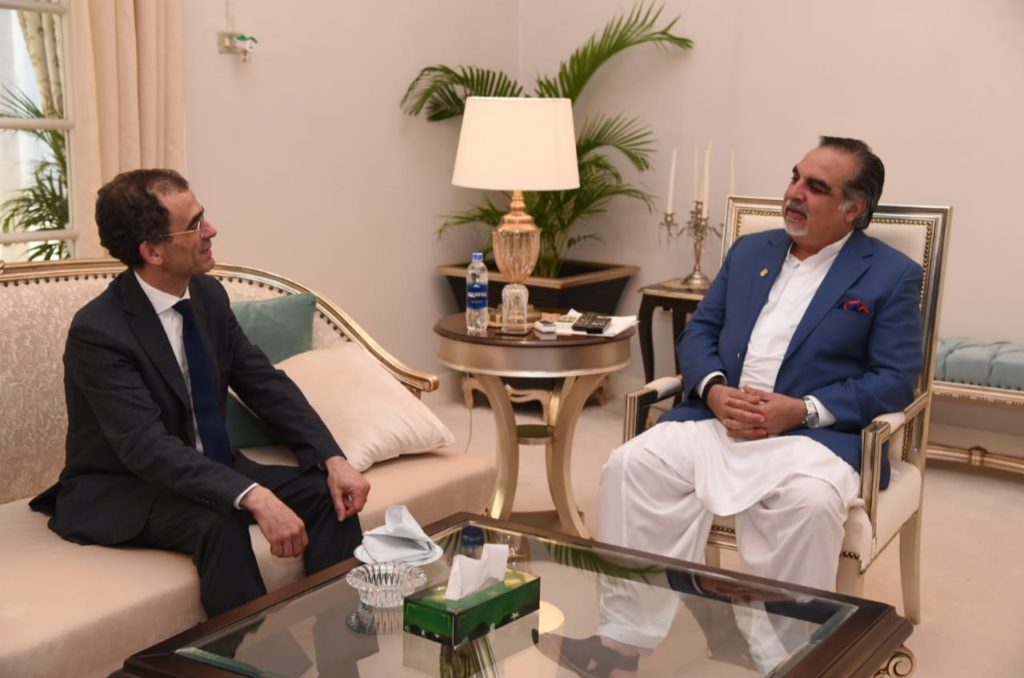
The Portuguese language is the fourth most spoken language in the world. We have 260 million speakers with Portuguese as their first language. Portuguese is also the official language in 9 countries in Africa, Angola, Brazil, Cape Verde, Guinea-Bissau, in Latin America and even in Asia. So Portuguese is the only language that is the official language of countries in all four continents, except English, of course. Portuguese is still spoken even in Macau, and is the working language of 32 international organizations and it is the fifth language with the largest number of users on the internet.
In the previous six months, we assumed the EU presidency. We draw some priorities in the social areas and the issues of environment and renewable energy. Since the Second World War the welfare state has become one of the main characteristic of European society, and it became very important in Covid-19 because the pandemic brought to light all the gaps, the differences between rich and poor, and the social problems that we face globally. So Portugal organized, in May, a European Union Social Summit in Europe to revive and to bring to new light the social values that underpin the European project, and that are today so important for development, for transforming the societies, for digitalization of societies and for the environment. The digitalization and modernization of societies has to go parallel with social issues. Modernization must not leave behind the poor people and progress must be for everyone. So these are the values that the Portuguese presidency and Portugal gives importance to. The huge transformation that societies today are going through with the need to modernize, digitalize, face development challenges, and population and migration challenges, it is important to be sure that we keep the human character in our societies. In Pakistan it is also very important; I think Pakistan in this pandemic was able to take the correct measures to protect the economy, the population and the poor people by taking the right decisions at the right time. I think we should congratulate the Pakistani government for that.
So Portugal today, as a member of the European Union, as the member of United Nations has given some people as the leaders of the world. The Secretary General of the United Nations, for example, Antonio Guterres is a good friend of Pakistan and is very well regarded in Pakistan. We also have the Director General of International Organization for Migration. We believe in dialogue in our foreign policy. We believe that all countries have differences, and today we are living in a very complicated international environment but it is important always to have open channels for dialogue and diplomacy.
Maybe it is better to finish here. I hope I did not take too much time and I hope it was interesting. Any questions please, I will be very happy to continue interacting with you. Thank you very much.
Mr. Arshad Saeed Hussain
Thank you, Excellency for a very informative session. As is customary in the KCFR sessions, participants ask questions so I have a list of questions which I will ask and being conscious of the time I will club some of the questions together. There are three categories of questions one is around education, the other is around tourism and the third is around technology and startups.
So, the first question is coming from Professor Siraj-ul-Huda from Saudi Arabia, and a similar question, is also asked by Professor Yaqoob Sial from Singapore and this is about education. What they are asking is that how can we manage student exchange? He has given the example of student exchange programs between Singapore and European Union universities, so is there a possibility of student exchange programs between Pakistani universities and Portuguese universities? What is your thought around that?
H.E. Paulo Neves Pocinho
We have the mission to strengthen bilateral relations. At this moment, there are no exchange programs for students between Portugal and Pakistan, but it is definitely one area in which we should try to bring together universities of both countries to create programs in which Pakistani students can study in Portugal, and Portuguese students can come to Pakistan. Even teachers coming from Portugal and Pakistani teachers going to Portugal to have, for example, workshops or small courses. It’s very important. We cannot strengthen the relationship and friendship without people-to-people contact.
I have been trying to, for example, in November I visited Gujarat University which has a very interesting campus. I am trying to visit different universities so that I can raise interest and then try to match their interest with Portuguese universities. So the challenge here is to have matching of interest in different areas and to find the right Portuguese universities to create these exchange programs. In Portugal, universities are autonomous. Even public universities take their decisions independently from the government.
We must try to bring them together to create such exchange programs but I just think that there is no substitute for the experience a student has when he goes to study to another country. For example, if a Pakistani student goes to Portugal or a Portuguese student comes to Pakistan, he will keep that in his memory all of his life. He will keep that friendship, closeness and an understanding of the country all his life. It is one of the areas that I am trying to work on to strengthen our relations. It is also a priority for Portugal because in the last 15 years Portuguese universities have a policy of internationalization so they want to attract foreign students.
We do not have a lot of Pakistani students studying in Portugal, but within the Erasmus program, which is a program sponsored by the European Union, Pakistani students are studying in Portugal. From my side, I will do my best, the Portuguese government is very much interested in the exchange programs.
Mr. Arshad Saeed Hussain
The next set of questions is around startups and IT. So there are two questions that I will read them out. One is from Mr. Babar Yusuf who is based in San Francisco and Islamabad, and his question is that Pakistan and Portugal both countries are seeing a growth in tech startups and venture capital. Is there a program to facilitate the tech and digital sector between the two countries? In terms of facilitation, it is through visas and other facilitation support to tech startups.
A similar question has also come from Mr. Jaleel Khwaja from Switzerland and the question is that Lisbon has transformed itself into a tech startup hub and is home to one of the largest annual tech conferences, the Web Summit. Given the rapidly growing investment in Pakistan, technology startups are attracting over $110 million in investment in the last few years alone. How can Pakistan and Portugal work together, learn from each other to encourage the development of technology and investment ecosystem?
H.E. Paulo Neves Pocinho
So in respect of startup programs, we don’t have a bilateral Portugal-Pakistan startup program but the Portuguese government has a general startup program. We call it Startup Visa.
There is information on the web page of the Embassy. The Startup Visa in general terms is a program in which the candidate presents a project for a company or for business, and then if this project is sent to a Portuguese entity through the Portuguese government to reach an institution in Portugal, and then they assess the potential of the project. And then they can even facilitate offices for incubators. If they accept the project, then the investor, or the interested person can apply for a start-up visa to stay in Portugal, and start his business in Portugal. I’m not capable of giving all the details of the process but this is a particular program for startups in which a person can apply, and then get a visa and go to Portugal for business. So, that’s a general program of all countries.
In terms of how to develop the interaction in technology, that’s a very interesting question regarding government. The tools usually available to governments are agreements or MoUs between the departments on both sides that are dedicated to development of technology. For that, we have to bring different departments together. In our day to day work, the most important thing is to help the companies that are interested in business, for example, the Pakistani companies doing business in Portugal, or the other way around. For example, last week I had a Portuguese company that approached me. It is a small company and they developed a software management program based on artificial intelligence. What I’m going to try is to find a partner in Pakistan to work with them. The business persons, the entrepreneurs have to come to the front and then the embassies and governments should try to help bring the companies together.
My opinion is that the actors in fact are the people themselves. The governments and embassies are the facilitators, but we are no business people. Without the support of the government, sometimes it is also not possible. So we have to bring these two levels together.
Mr. Arshad Saeed Hussain
Thank you, your Excellency. The third question is around travel and tourism, and this is about tourism on both sides; to Portugal and from Portugal to Pakistan.
The first one is about Portugal and that is around when will tourist visa services reopen and consular services resume in Pakistan and also there is a question around how can we promote Lisbon, Portugal as a tourist destination for the Pakistani tourists travelling to Lisbon. Can the Embassy facilitate and connect us to top tour operators in Lisbon and also explore other B2B opportunities between Pakistan and Portugal. This question is coming from Sadaf Khalid who is the director at Walnut Travel Tours, a consultancy in Islamabad.
H.E. Paulo Neves Pocinho
So in respect of the consular services and visas, the Embassy is providing all consular services now already. But in respect of the visas in the Covid-19 situation, we are still limited to what we call essential travel. We are not completely open to tourism yet. I hope that in the next two months European Union countries in general and in particular, Portugal does open to tourism, but that depends on how the pandemic progresses.
Tourism is very, very important for Portugal as 20% of the Portuguese GDP is related to tourism. It was before the pandemic, so it is one of the main priorities for us, in terms of commercial services. The Portuguese government is assessing the situation every day to see when we can open tourism completely.
Mr. Arshad Saeed Hussain
Thank you and I think the people of Pakistan are eagerly awaiting for the resumption of regular travel and not essential travel to Portugal. The next question is around tourism from Portugal to Pakistan. And the question is, we would welcome tourists from Portugal to Pakistan in the beautiful northern areas and the warm sea shores of the South. What can you do to encourage that?
H.E. Paulo Neves Pocinho
The main thing I could do is to welcome Portuguese people to Pakistan. Usually I say that this is a very rich country. Of course, the north has fantastic landscapes, unique in the world, but I also think in Pakistan you have many cultural areas that can be open for tourism. I visited some places and found it is a very culturally rich country. In general, people all over the world would like to see the mountains in the north of Pakistan but also the cultural sides of Pakistan are very interesting. What I would like to see also would be some interaction between both countries. Pakistan is able to promote the north because it’s fantastically beautiful, but I think you could also promote different destinations, not only the North. I think we could exchange views in terms of the experience. Portugal already has a big hospitality industry because its areas are more developed compared to the last 20 years, we developed the hotels, heritage buildings etc. We tried to develop different packages and different options for hotels to enjoy the country. I think we have developed a very interesting tourist industry and it would be useful to exchange views with Pakistan. We can discuss it with Pakistan to bring people to visit the country.
Mr. Arshad Saeed Hussain
I think we can learn a lot in terms of tourism from Portugal and thank you for a very informative question and answer session. I will now request our Chairman Mr. Ikram Sehgal to conclude the session.
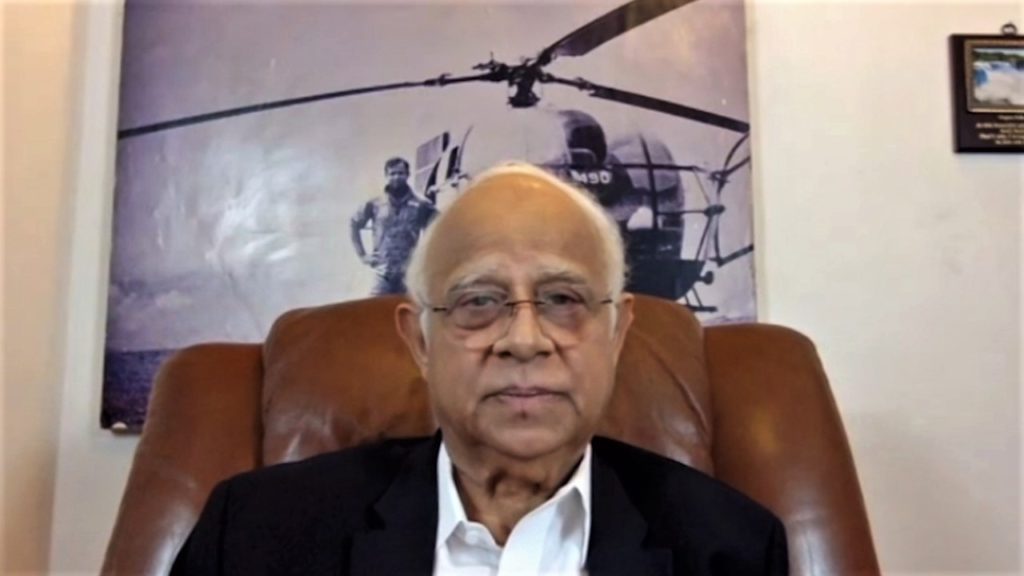
KCFR Chairman Mr. Ikram Sehgal: Excellency, thank you very much. This has been the most informative and educative session. Before I thank all the participants and panelists, I would just like to say a few things. I am not a stranger to Portugal in the sense that I first went there in 2017 to speak at the Horasis meeting in Cascais. And I have been there in 2017,’18 and ’19, and Cascais is a beautiful place. Of course, I learnt a lot about Portugal by visiting Cascais. I also found out that in Cascais all school children are given IT education and 100 percent school children are IT literate. A lot of startups are based in Cascais, and the Mayor of Cascais and other senior officials were so assertive about startups and inviting investments; it was really impressive.
I must thank the gentleman Dr. Frank Richter, who is the head of Horasis which is basically known as a mini World Economic Forum now, because it concentrates on Europe and China, but it has done a lot of work and for me, it was a revelation to visit Portugal for the first time. I would tell you also something personal; that my executive secretary Humera Gasper who has been with me for 17 years, is married to a person of Portuguese descent, in fact, from Goa, Mr. Richard Gasper, who also works for me in a different company that is another connection that I have. The third connection that I must tell you about Portugal is that in the second trip I took my daughter Nefer with me. Nefer has been with me traveling all over the Europe by road. When we reached Portugal after some time she said, ‘I am home.’ I asked her, why? Because, you know, there are very nice restaurants in Paris, beautiful views in Switzerland etc. In Portugal the people are very friendly and for me, it is very easy to communicate. And I was encouraged then and she said, “if I want to make another country my home, I would like it to be Portugal”.
I must tell you the first time I came across people of Portuguese descent. Fifty years ago, I was flying the Governor of then East Pakistan Admiral Ahsan after a very catastrophic cyclone which almost killed three million people in the Bay of Bengal, and I was flying him to the islands of Bay of Bengal. After I landed at a place called Karakata I was very tired, and the Governor walked out to visit people, and I fell asleep. When I woke up with a start, I saw a lot of children, having green eyes peering at me in the cockpit of the Alouette-3 helicopter that I was flying, I was very intrigued by this. I found that these were descendants of Portuguese pirates who had settled in the islands of the Bay of Bengal. Can you imagine going back so many years? You were talking about Vasco de Gama, they came as traders and following them came the pirates from various European countries including the Dutch and Spanish. Those of Arab descent settled in Hatiya and Sandwip Islands.
I think we have a lot to talk about between Portugal and Pakistan. I must tell you that Karachi Council on Foreign Relations along with the Jinnah Society has acquired the Quaid-e-Azam House Museum, which is known as the Flagstaff House to build a nation-building Institute. We are also building a world-class auditorium, for which Mr. Arshad Saeed Khan is going to be the head of that particular committee. So in future, other than webinars, we will certainly hold seminars in that location whenever the pandemic is over and we would certainly like you to be there.
It is my duty to thank first of all I will start with Ambassador Zehra. It was very informative, Ambassador Zehra. I am only sorry that I missed you in Portugal. I was there in 2017, later on you left, but we should have connected. Thank you very much. It was very informative, and I hope that you will be a regular participant of our webinars. In the future, we will certainly inform you and keep you in the list.
I must thank the moderator Mr. Arshad Saeed Hussain. He has taken Oxford University Press to a new height and there is no doubt about that. The literary festivals, despite the pandemic have been so well received in Karachi and Islamabad that it is amazing. I am looking forward to the day when the pandemic eases and people really get together and more and more people come because I think the Oxford University Press really contributes a great deal to the education of Pakistan. Beyond the education of Pakistan through textbooks, the education of the people of Pakistan through books on history, geography, literature, the books on fiction which are projecting Pakistan’s culture, image etc. are tremendous.
I must thank the Secretary General Commodore Sadeed Malik; basically a submariner. He speaks French very fluently and has actually been educated in a French Institute also from the Pakistan Navy side. He is the backbone of Karachi Council on Foreign Relations. Without him, we would have gone nowhere. I must commend him for the amount of work that he has done and it is a matter of great pride for me. We go back almost 55 or 56 years when we were both in the military academy together, I as an army cadet and he as a naval cadet, we were both cadets together in the Military Academy in Kakul. It is my fortune to have been blessed still with his company 56 years later.
Excellency, how can I thank you. You know, it has been very informative. We were supposed to have one hour but we have passed the one hour because of the fact that we really learnt a lot. I hope that this will be the beginning of a long association with you, because we need to know more about Portugal and Portugal needs to more know more about Pakistan. The interaction must be much more. We have much more in common than people realize. For many reasons, like you said, Vasco de Gama was the first one into the Indian Ocean, trying to discover a sea route. The amount of things that we have in common, we have never really leveraged it. The main thing is that on a broad level Pakistan and Portugal must engage. We are very grateful for this presentation that you gave and I hope we will go beyond that. I now request Commodore Sadeed Malik, thanking you most profusely, to end the webinar.
Commodore (R) Sadeed Malik
Thank you very much, Sir. Thank you, your Excellency. Thank you, Ambassador Zehra Akbari. Thank you, Mr. Arshad Saeed and especially the participants from Switzerland, Singapore, Saudi Arabia, Islamabad, and of course our members and participants from Karachi. The webinar is concluded. Thank you very much.




